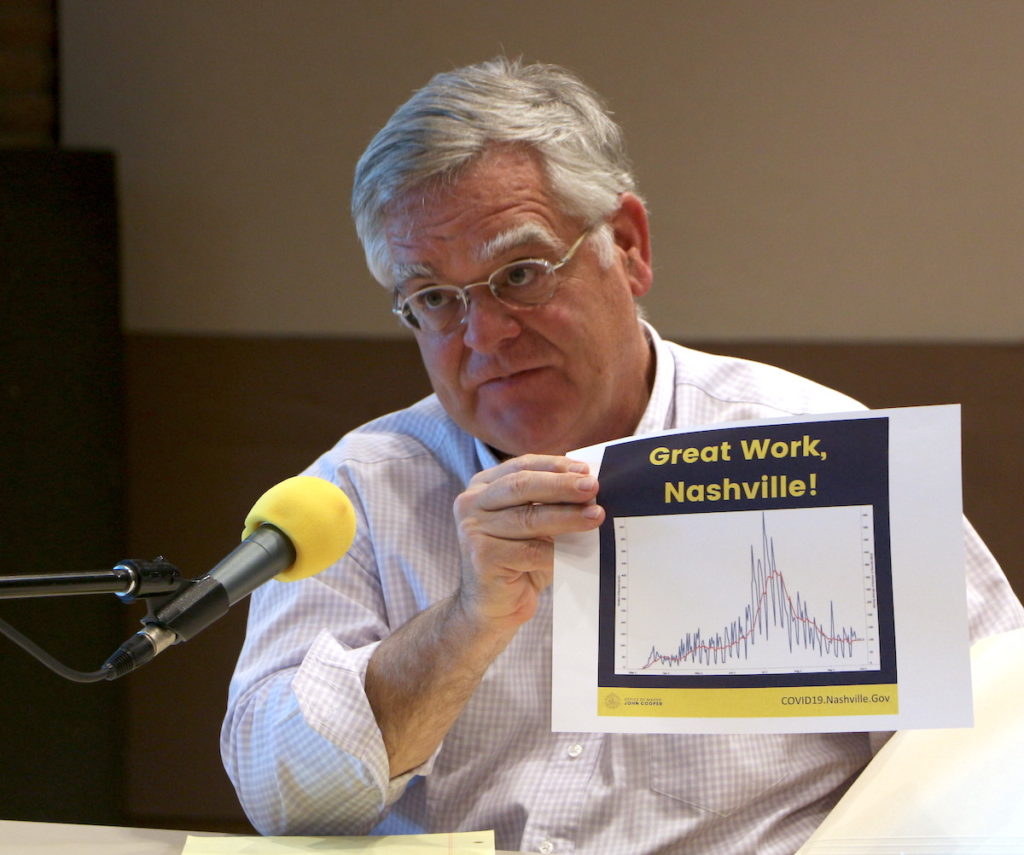
Tornadoes, the COVID-19 pandemic, protests over racial injustice and a controversial budget crisis are just a few of the challenges Nashville Mayor John Cooper has faced in his first year.
The through-line of all of these events is the question of who the city serves. WPLN News has a policy promise tracker for residents to monitor the status of various policies under the Cooper administration.
And the mayor recently sat down with Metro beat reporter Ambriehl Crutchfield to discuss his term. She shared the highlights with Morning Edition host Nina Cardona.
In his first year, what is the Mayor touting as his accomplishments?
Cooper secured $12.6 million from the convention center to partially plug a hole in the city’s budget, which was in bad shape even before the economic impact of pandemic.
The emergency communications center is fully staffed and the answer time has improved.
But the biggest item, by far, that he got passed is the 34% property tax increase. That’s something he resisted while campaigning, but once he was in office he convinced a majority of the council to approve it.
This past year has been one that would challenge any mayor, anywhere. The pandemic and the tornado — either alone would be the kind of event to force pauses or changes to municipal programs or plans. What projects are still in progress?
Cooper says he’s sticking with his initial plan to improve neighborhoods, rebuild trust and be financially responsible.
Cooper’s administration is working on a transit plan that largely relies on improving the bus system we have using outside sources for funding. He’s planning to present the details to council by the beginning of next year.
Cooper hasn’t specified how many affordable housing units he plans to build. His spokesperson says that’ll be a part of a 10-year goal that they’re currently creating.
At the beginning of the summer Nashville had protests against systemic racism and police brutality. Cooper spoke at one of the protests, which drew mixed responses from both protesters and people that opposed the demonstrations. What does Cooper say he learned from that?
He says he heard protesters didn’t feel that public safety was serving them as well as they should be.
Cooper says he understands that everyone wants to be represented, feel safe and have a good relationship with officers. He says he’s addressing those concerns through a diverse police chief search committee.
“Ultimately public safety is a community demand. I think this is a part of the discussion of ‘defunding’ the police that I think baffles me and the council,” Cooper says. “Very few people are saying they want their community to be less served. Right? Defunded. We want more and better.”
So while safety is a concern for residents, the mayor seems to be missing that the core issue is the lack of trust different marginalized communities have with a policing institution that has repeatedly harmed and killed them.
Cooper, meanwhile, has negotiated for body-worn cameras for officers and created a policing commission to review use of force policies.
But people that want safety alternatives outside of the current policing system have been clear that small reforms and diverse representation won’t solve the core issue.
In last year’s election, 70% of Davidson County voters supported Cooper. But in the last few months he’s been under attack by state and local conservatives for his response to the COVID-19 pandemic. There have even been petitions to get him out of office. How is he navigating the pressure?
Cooper is bold in his response, saying that Nashville’s handling of the pandemic has helped the state overall.
“We have the natural conditions here to be the No 1. worst,” he says. “We’ve got prisons and nursing homes and hospitals and denser living and downtown and shopping. The fact that we’re not is a triumph.”
He says he isn’t focused on a small number of people with loud voices but is focusing on the impact his decisions will have on the overall population.

